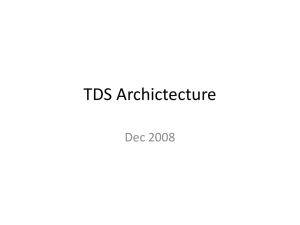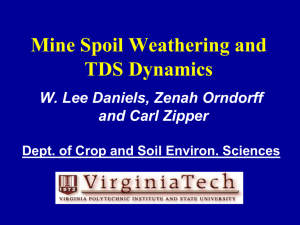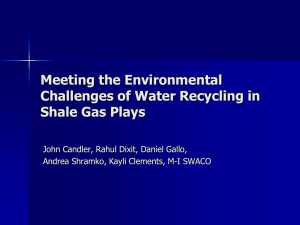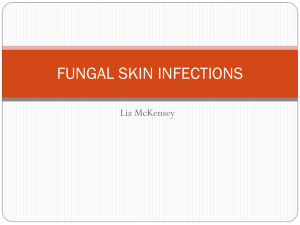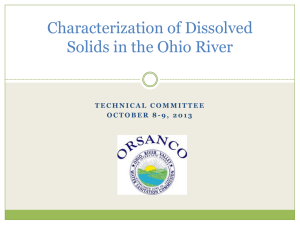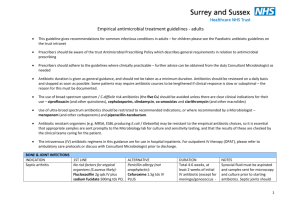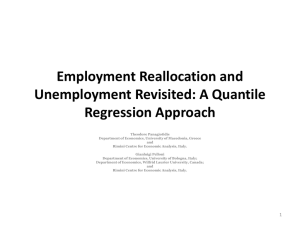ppt 3.28mb - West Virginia Mine Drainage Task Force
advertisement
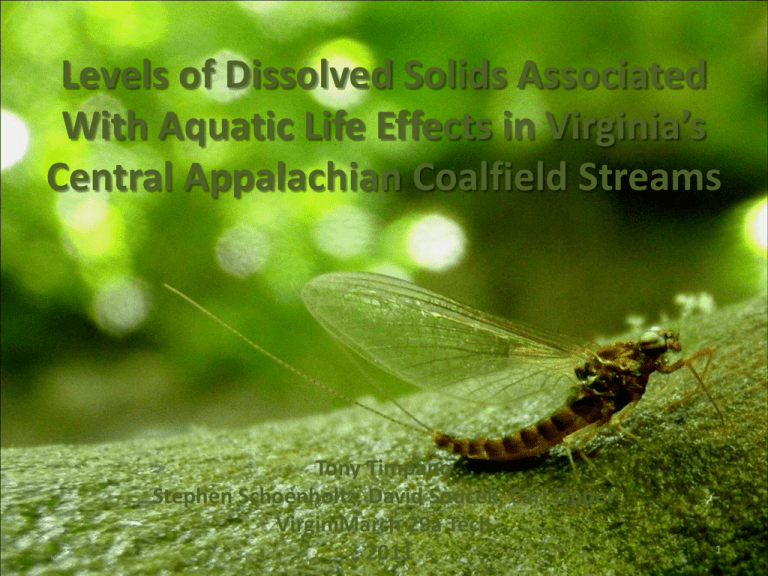
Levels of Dissolved Solids Associated With Aquatic Life Effects in Virginia’s Central Appalachian Coalfield Streams Tony Timpano Stephen Schoenholtz, David Soucek, Carl Zipper VirginiMarch 29a Tech , 2011 1 Background • Question: what is TDS relationship to aquatic life? EcoAnalysts, Inc. EcoAnalysts, Inc. Wayne Davis USEPA Ephemeroptera Plecoptera Trichoptera (Mayflies) (Stoneflies) (Caddisflies) • Challenge: TDS often with other stressors • Approach: Evaluate TDS effects with other stressors minimized 2 Site Selection • Systematic: GIS prescreen, ground-truth • High-Quality Habitat • Avoid Non-TDS Stressors: Iron Seep Sedimentation 3 Data Collection • Field • Lab – RBP Benthic Macroinvertebrates – RBP Habitat – Temp, pH, DO, Cond. – Water grab samples – Fall 2008, Spring 2009, Fall 2009, Spring 2010 – – – – – Family & Genus “bugs”, VASCI TDS Alkalinity (for HCO3-) SO42-, Ca2+, Mg2+, Na+, K+, Cl– Al, Cu, Fe, Mn, Se, Zn 4 R. J. Krenz Site Selection & TDS Composition 5 6 Results – Site Selection • Non-TDS stressors not evident Mean RBP Habitat Score – Habitat comparable to reference – pH 6.6 – 8.5 – No obvious NPS Pollution 190 185 180 175 170 165 160 155 Ref Test 7 Reference Site (22 mS/cm) Test Site (265 mS/cm) Test Site (594 mS/cm) Test Site (1,670 mS/cm) 8 TDS Mean Ion Proportions K Na 3% 6% Mg 4% Cl 7% Mg 7% SO4 26% K Na 1% 6% Cl 1% Ca 13% SO4 46% Ca 11% HCO3 43% Reference Sites Mean TDS: 21 mg/L HCO3 27% Test Sites Mean TDS: 406 mg/L 9 FAW GRA CAW SPR FRY HUR RAC RFF SPC RUT ROL LAB JES BIR GIN MIL KEL POW KUT CAN RIC Ion Concentration (mg/L) Test Site Mean Ion Concentrations 1400 1200 1000 800 600 400 200 K Cl Na Mg Ca HCO3 SO4 0 Site ID 10 Test Site TDS Seasonal Variability 1400 1200 TDS (mg/L) 1000 800 600 400 200 0 Fall 2008 Means: 566 n=8 Spring 2009 371 n = 16 Fall 2009 485 n = 19 Spring 2010 371 n = 21 11 VASCI – TDS Associations Analyses that follow should not be interpreted to indicate actual, potential, or suggested water quality criteria for TDS or component ions. 12 Analysis Methods • VASCI = multimetric index of benthic macroinvertebrate community integrity (0-100 pts) • Evaluate VASCI-TDS Relationship – Least Squares Linear Regression – Quantile Linear Regression • Observed Effect Concentration (OEC) = TDS concentration where VASCI = 60 13 Correlations: Test Sites VASCI TDS SC Ca2+ SO42Mg2+ K+ HCO3Na+ Cl- -0.64 -0.63 -0.61 -0.58 -0.55 -0.54 -0.42 -0.35 TDS mg/L SC mS/cm 0.99 0.91 0.92 0.87 0.90 0.64 0.34 0.90 0.91 0.85 0.89 0.67 0.37 Ca2+ SO42- 0.94 0.95 0.82 0.45 0.94 0.83 0.38 Mg2+ K+ mg/L 0.81 0.35 0.63 0.31 HCO3- Na+ 0.67 0.30 0.58 all correlations significant (p < 0.05) Measures Evaluated Highly Correlated Measures 14 VASCI Seasonality 80 75 80 VASCI Score VASCI Score 85 75 70 65 60 Fall n=6 Spring n=9 Reference Sites 70 65 60 55 50 45 40 Fall n=27 Spring n= 39 Test Sites Spring VASCI scores > Fall VASCI scores at test and reference sites 15 VASCI vs. TDS (LS Regression) OECs: VASCI = 60 Model SC (mS/cm) TDS (mg/L) SO42- (mg/L) Spring All - Year Fall 768 634 523 528 422 337 336 219 143 16 VASCI vs. TDS (Quantile Regression) Q90: 90th quantile = 90% of data below line Q50: 50th quantile = 50% of data below line Q10: 10th quantile = 10% of data below line Q-value = probability of VASCI < 60 OECs: VASCI = 60 Quantile SC (mS/cm) TDS (mg/L) SO42- (mg/L) 90 75 50 25 10 not sig. 903 625 429 281 not sig. 637 421 263 142 not sig. 392 219 133 48 17 Observed Effect Concentrations (OECs) • OEC = concentration where VASCI = 60 Probability of VASCI < 60 at OEC (%) Model/ Quantile (%) SC mS/cm TDS mg/L SO42mg/L 50 Fall All-Year Spring 523 634 768 337 422 528 143 219 336 Quantile Regression 10 25 50 75 10 25 50 75 281 429 625 903 142 263 421 637 48 133 219 392 Measured Values 0 100 All-Year All-Year 332 1,366 190 1,108 70 849 Method OLS Regression 18 Probability of VASCI < 60 Prob. of Biological Effect (VASCI < 60) 1.0 1108 0.9 0.8 0.7 637 All Fall Year Spring 337 422 523 0.6 0.5 421 0.4 0.3 0.2 Quantile Regression OLS Regression Measured 263 0.1 142 190 0.0 0 200 400 600 800 TDS (mg/L) 1000 1200 19 Considerations • OEC ≠ Toxicity • TDS Composition: SO42- and HCO3- dominant, Ca2+ dominant cation • VASCI Seasonality: Spring > Fall • Variability of VASCI – TDS Association • Variability of TDS (Temporal) 20 Field Sensitivity Distributions Analyses that follow should not be interpreted to indicate actual, potential, or suggested water quality criteria for TDS or component ions. 21 Field Sensitivity Distributions • Salt tolerance of individual benthic macroinvertebrate genera • Maximum Field Concentration (MFC) – MFC = highest conc. where genus observed • Cumulative Distribution Function (CDF) of MFCs • X% Observed Effect Concentration (OECX) – OECX = conc. affecting X% of genera 22 Macroinvertebrate Genera • 97 genera • Excluded genera (37) – < 4 observations/genus (5% of 81 samples) – Genera not at reference sites • 60 genera used • Spring, Fall, All-Year models 23 TDS FSDs 24 X% Observed Effect Concentrations Water Proportion Quality of Taxa Parameter Affected Specific Conductance 5% 10% 20% Model Fall 450 476 653 TDS 5% 10% 20% 273 288 421 5% 10% 20% 120 163 210 SO42- Spring (mS/cm) 465 511 647 (mg/L) 291 311 422 (mg/L) 160 221 250 All-Year 462 490 652 281 298 411 108 156 221 25 Orders • Mayflies most sensitive (E) • Stoneflies least sensitive (P) 26 Considerations • • • • • OECX ≠ Toxicity Small Sample Size = Few Taxa Method sensitive to rare taxa Truly rare taxa? too few samples to know Temporal variability of TDS 27 Further Research Needs • TDS Temporal Variability TDS (mg/L) 1500 ? 1000 500 0 Jan 2005 Jan 2006 Jan 2007 TDS (DMME) Jan 2008 TDS (VT) Jan 2009 Jan 2010 Data: DMME & VT 28 Questions? Study Sponsors: Virginia Dept. of Environmental Quality Virginia Dept. of Mines, Minerals, and Energy Powell River Project 29


